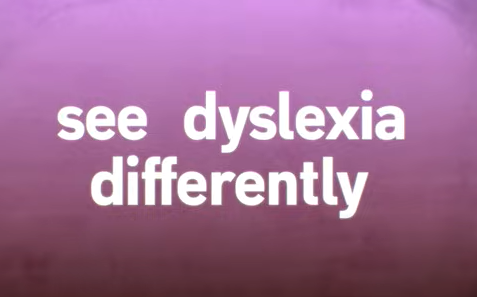Think you might have dyslexia, dyspraxia or dyscalculia?
Click the image to watch the video (From British Dyslexia Association, January 2025)
Dyslexia is a specific learning difference which primarily affects reading and writing skills. However, it does not only affect these skills. Dyslexia is actually about information processing. Dyslexic people may have difficulty processing and remembering information they see and hear, which can affect learning and the acquisition of literacy skills. Dyslexia can also impact on other areas such as organisational skills.
(Adapted from the British Dyslexia Association, Jan 2025. https://www.bdadyslexia.org.uk/dyslexia/about-dyslexia/what-is-dyslexia )
Everyone's experience of dyslexia will be individual to them but there are common indicators. A cluster of these indicators alongside abilities in other areas could suggest dyslexia, and should be investigated further.
Do you:
- Confuse visually similar words such as cat and cot
- Spell erratically
- Find it hard to scan or skim text
- Read/write slowly
- Need to re-read paragraphs to understand them
- Find it hard to listen and maintain focus
- Find it hard to concentrate if there are distractions
- Feel sensations of mental overload/switching off
- Have difficulty telling left from right
- Get confused when given several instructions at once
- Have difficulty organising thoughts on paper
- Often forget conversations or important dates
- Have difficulty with personal organisation, time management and prioritising tasks
- Avoid certain types of work or study
- Find some tasks really easy but unexpectedly challenged by others
- Have poor self-esteem, especially if dyslexic difficulties have not been identified in earlier life
(Adapted from the British Dyslexia Association, Jan 2025. https://www.bdadyslexia.org.uk/advice/adults/am-i-dyslexic/signs-of-dyslexia )
Step 1 – QuickScreen
Email disability@worc.ac.uk and ask for access to the online QuickScreen resource.
QuickScreen takes about 1 hour and is a series of mini-tests that can identify traits of dyslexia. It is also useful for identifying traits that dyslexia shares with dyspraxia and dyscalculia.
QuickScreen does not provide a diagnosis of any specific learning difficulty, but we use it to investigate if a full diagnostic assessment is called for. Based on the results of QuickScreen, we may be able to provide reasonable adjustments during your course and exams.
QuickScreen is available to current students at the University of Worcester, or prospective students who have accepted a firm offer of a place at the University. There is no cost to you as the University pays for QuickScreen.
Step 2 – A Disability Adviser Appointment
After you have completed QuickScreen, book an appointment with a Disability Adviser. During the meeting, they will discuss the outcome of the QuickScreen tests and recommend your next steps, which could include recommending a full diagnostic assessment.
If you have any questions, contact us at disability@worc.ac.uk
Get in touch
Email: disability@worc.ac.uk
Phone: 01905 855531
Book an appointment with a disability adviser.
We offer online appointments using Microsoft Teams or in person at firstpoint, Peirson Centre, St Johns Campus.
Appointments last a maximum of 45 minutes.

